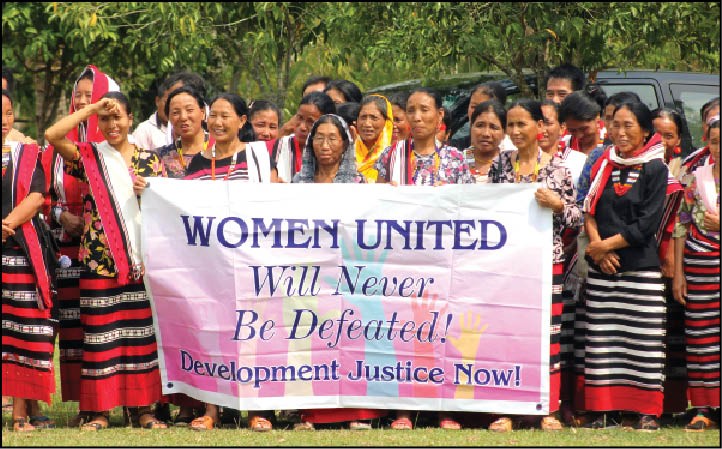The Sisterhood Network collaborated with the Beisumpuikam Women’s Society (seen here) on April 16 as part of a Land Feminist Participatory Action Research. (Morung Photo)

Sisterhood Network collaborates with Beisumpuikam Women’s Society to address gender equality
Morung Express News
Peren | April 16
Article 371-A may not protect the Nagas forever and land may eventually be privatized or nationalized, with individuals holding a restricted amount of land. If such a scenario unfolds, one of the ways for communities to hold on to land, and thus their identity, would be to distribute it squarely among women and men.
This idea was proposed by Akeina Gonmei, Development Secretary of the Rongmei Baptist Association (Nagaland) and Chairperson of the Sisterhood Network (SN) board, at Beisumpuikam Village, Peren district, on April 16 while speaking on the theme ‘Strengthening community through equal participation of women and men in decision making.’
In one of several attempts to achieve Goal 5 of Gender Equality among the United Nations’ set Sustainable Development Goals, the SN has been working on a Land Feminist Participatory Action Research (LFPAR) with the Beisumpuikam Village Women’s Society, also engaging its Village Council, Development Board and churches (Baptist and Presbyterian). On Tuesday, they came together to host a community feast at the Beisumpuikam Baptist Church, but also to contemplate on a gender equal future.
“Our land gives us our songs, clothes and the designs on them. It gives us our identity. We should be careful while selling it to others. More essentially, in order to avoid being disenfranchised from our land, we should distribute land among both women and men,” urged Gonmei, while addressing a robust group of men and women, including the Beisumpuikam Village Council Chairperson, who attended the event.
Even in governance, “women were not given to men to make tea!” She challenged women to retain their economic security within the household as well as to participate, speak and address issues at Village Development Board meetings.
Economic, social, political progress requires the community to move forward together. This change, she said, must begin from the villages. “If our villages accommodate women, our cities will follow. Beisumpuikam must become part of this change,” she asserted.
Why the exclusion?
While making family decisions, women and men often put their heads together. “Then why do we exclude women while making big decisions for the community?” asked Azungla James, Director of Sisterhood Network, while acknowledging the participation and support of the male leaders of Beisumpuikam Village in conducting the LFPAR, a participatory research method that involves several steps that lead up to actions for communities to progress together. The SN has been conducting this through mentorship from Asia Pacific Forum on Women, Law and Development.
“All our customs, norms and traditions are human made and we are in a position to change it; to include women in leading the community for it to grow steadily as a whole,” she held.
Dr. Pangernungba Kechu, Dean of Post Graduate Studies at the Oriental Theological Seminary, backed this thought.
“Our traditional practices were designed for the preservation of small villages when no technology existed. We need to re-design them in the modern context to strengthen the future of our children,” he said. Giving the example of western societies that have progressed based on norms of gender equality, he said that husband-wife or sister-brother have to move ahead as equals in order to bridge the gaps in gender or wealth that have become colossal in Naga society.
Such gaps often lead to violence and conflict. In the Naga case, ‘factionalism’ in the state, non-state, even the church, has led to violence that has been contained through the “tears and prayers of our women and mothers,” admitted Dr. Pangernungba.
“To create an inclusive future, we need to incorporate the wisdom and voices of women, as well as young people, while making policies,” he encouraged.
Today’s program saw a mega Community Feast preceded by a Zeliang Traditional Dance presented by the Beisumpuikam Women’s Society that earned them the head of one of the two pigs cut for the occasion, in an attempt to bring women and men together to understand the values and need for a gender just society.


